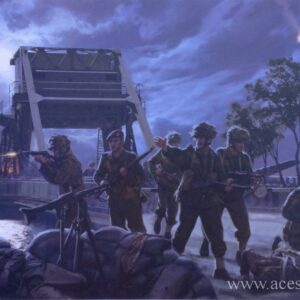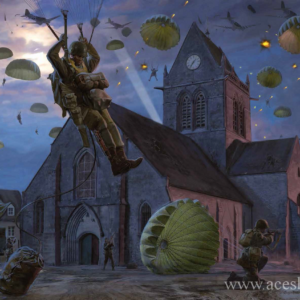Description
By September 1944 there was growing Allied optimism in France; having broken out of Normandy their armies were now pushing steadily west. Yet as the enemy fell back the Allies’ supply line was becoming dangerously stretched. Newly-promoted Field Marshal Montgomery therefore argued that these limited resources be concentrated into a single push into the Netherlands, aiming to turn the German flank. Eisenhower disagreed, preferring a broader advance towards the Rhine. But, as a compromise, he did give Montgomery their one available reserve, the First Allied Airborne Army, with which he could try and seize bridges in the Netherlands to allow for a dash to the Ruhr in an operation code-named Market Garden.
Commencing on Sunday 17 September 1944, Market Garden tasked the US 101st Airborne to capture canal crossings at Eindhoven whilst the US 82nd Airborne would seize the bridges at Grave and Nijmegen. The most distant and hardest objective was given to the British 1st Airborne who would land on the north bank of the Rhine, secure the bridge at Arnhem and hold it until the armored British XXX Corps, advancing quickly north, could link up with all three Airborne Divisions and consolidate the salient.
There were, however, flaws: planners failed to act upon intelligence that two crack SS Panzer Divisions were among many German forces regrouping near Arnhem and, due to insufficient aircraft numbers and bad weather, it would take several days to deliver the entire British force into theater.
The 101st and 82nd soon secured their objectives and linked up with XXX Corps, but at Arnhem the operation was running into trouble because, despite a small force successfully seizing the bridge, the lightly armed British were coming under mounting enemy resistance, especially from the two Panzer Divisions.
Four days of bitter fighting and heavy casualties went by before reinforcements, the Polish Parachute Brigade, could be dropped on the south bank of the Rhine but heavy German counter attacks, having already re-captured the bridge, constrained the Polish force and slowed the advance of XXX Corps.
Short of ammunition and supplies, the remnants of British 1st Airborne were by now fighting for their lives within an ever-decreasing defensive pocket to the west of Arnhem, and by the time XXX Corps finally arrived to link up with the Poles it was too late – barely a fifth of 1st Airborne’s 10,000 men were able to withdraw. Using rubber boats to cross the Rhine to safety they left behind nearly 1,500 men killed and more than 6,500, including many wounded, taken prisoner.
Simon’s graphic portrayal depicts a scene on the first day of Operation Market Garden as, early in the afternoon, glider borne infantry from the British 1st Air Landing Brigade successfully secure “DZ-X,” the drop-zone on Renkum Heath several miles to the west of Arnhem. Overhead paratroopers from the 1st Parachute Brigade begin their drop from USAAF C-47s.
To commemorate the 75th Anniversary of the fierce battles at Arnhem and to remember the heroes who served during Operation Market Garden, each print in this memorable edition has been authenticated by veterans who fought bravely as the Allies pushed for victory in Europe during WWII.
THE SIGNATURES
Joining artist Simon Smith in signing every print are two veterans who served with the Glider Pilot Regiment at Arnhem:
Sergeant MIKE BROWN
Sergeant FRANK ASHLEIGH








Reviews
There are no reviews yet.